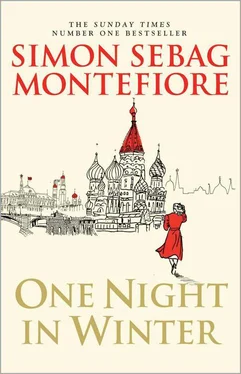The only sounds were his puffing and the creak of his leather boots. No one spoke. Bolshakov’s face was flushed, and his bald head glistened with sweat. ‘Forgive or not to forgive? All right, Bolshakov, we’ll forgive. But next time: curb the kissing!’
Next, he gave Romashkin instructions for a new project: he must rewrite Ivan the Terrible Part Two. Eisenstein was not to be trusted with the script again. ‘Don’t just show that Ivan was cruel,’ said Stalin. ‘Show why he needed to be cruel. Understand?’
Romashkin wrote down his instructions but at the end of the meeting he asked if he could create a part for his wife, Sophia Zeitlin.
‘Sure,’ said Stalin. Well, what’s good for the goose is good for the gander, so why not?
Sophia Zeitlin was a beauty, he decided, quite a temptress by all accounts (oh yes, Marshal Shako fancied himself a chivalrous knight, but he’d had a few tales to tell after they’d given him the good beating he deserved). But her looks, those bold black eyes and heavy eyebrows were Jewish, the name Zeitlin was Yiddish and he wondered if she was Russian enough… The Jews were everywhere; they wanted to commandeer the war itself, claiming they, not the Russians, had suffered most at the hands of the Nazis. Some of them wanted their own Zionist country in the Crimea, others wanted a new Judaea in Palestine. They were never loyal to anyone. What if they really supported America? Even his darling Svetlana had married a Jew. Those Jews were worming their way into his own family.
Stalin’s head was spinning again so he had himself driven home to the Nearby Dacha where he lay on the divan in his office. Abakumov, now promoted to Minister of State Security, was already there, standing to attention. During the next half-hour, he reported on round-ups in Berlin, Ukrainian nationalists to be executed, new intelligence on the American atomic project from the MGB’s British agents, the case of a Swedish count arrested in Budapest.
Stalin tried to concentrate but his joints ached as they had ever since his Siberian exiles. Abakumov was a crude policeman, an oaf to be sure, but thank God he was competent.
Now he came to the aeroplane scandal that he called the Aviators’ Case. Marshal Shako had been broken, was blaming everyone else, even Satinov, for his faulty planes, and had denounced Marshal Zhukov for exaggerating his role in the victory (Good, thought Stalin, we’ll show Zhukov who’s boss here). The Children’s Case was solved and before their release the children had confessed to writing anti-Soviet materials.
It transpired that Serafima, Romashkin and Zeitlin’s daughter, was not behind the conspiracy, after all. Abakumov had uncovered the Enemy who had encouraged the children to embrace anti-Soviet romanticism and play at being leaders: the criminal, who had confessed, was none other than the writer Benya Golden, who had somehow inveigled his way into School 801 as a teacher.
‘I thought we’d dealt with him before the war,’ Stalin said.
Abakumov was about to explain but Stalin waved him aside. ‘Maybe this time, when we’ve finished with him, he’ll be shorter by a head. But we still need to punish the children, don’t we?’
‘Yes, Comrade Stalin. But I have one additional development to report. Instead of using French wrestling, I released Serafima early, anticipating that she would lead us to any inappropriate contacts. We knew from an informant at the school that she was meeting someone. We were told that her lover was leaving notes for her in certain foreign books at the House of Books.’
‘Which books?’ Stalin was curious. He loved books.
Abakumov consulted his notes while Stalin fidgeted impatiently. ‘Novels by Hemingway. Edith Wharton. Galsworthy.’
‘Good taste,’ said Stalin, noticing Abakumov had clearly not heard of any of them. The uncouth clod.
‘Yes, well, naturally we followed her, via the Bolshoi Theatre, and she led us to a love nest. We observed her regularly meeting a young American diplomat. We bugged the apartment. He has proposed marriage to her and she has accepted him.’
‘They fuck in this apartment?’
‘Yes, Comrade Stalin.’
‘She’s only eighteen. As a father…’ Then he remembered that his daughter Svetlana had had an affair with a forty-year-old married screenwriter at sixteen. A Jew. He had slapped her face.
‘The American is young too,’ continued Abakumov, ‘but the whole business is rotten. Since 1941, we’ve allowed over eight thousand Soviet women who’ve met allied servicemen to follow their foreign partners abroad so I presume we will allow Serafima to go to America with her fiancé, but in view of her prominent family…’
Stalin lay back on the divan, inhaled on the cigarette and closed his eyes for a second. The country was devastated, surrounded by enemies, infliltrated by agents, threatened by America. Discipline was essential. But this girl was in love. She was young. She had been in prison. Why shouldn’t young people fall in love? he thought. He remembered his wives, his many girlfriends. If only there had been more love in my life, he thought despondently, but we Bolsheviks are a military-religious order like the Knights Templar. The Revolution always came first. I was no husband and now I’m alone. He sighed. Always alone.
‘I think we should grant one month more for those wartime love affairs,’ Stalin said finally. ‘Then the gates close.’
He’d just remembered that Serafima was the daughter of a Jew. Another Jew.
It was Satinov’s birthday and before he left the office for home, he noticed that an envelope had appeared in his in-tray typed: ‘Com. Satinov. Secret.’ When he opened it, all he found was a page ripped from a book of Chekhov’s stories. There was nothing else in the envelope so he started to read.
Satinov had read very little literature, yet Stalin often told him that he must read Chekhov to improve himself – ‘I’m old but I never stop studying,’ Stalin said – but Satinov was always too busy.
Now he read this page from a story called ‘The Lady with the Little Dog’. The hero and heroine, both happily married to others, meet at the Yalta resort and begin an affair. He read that they ‘loved one another as close intimates, as man and wife, as very dear friends. They thought that fate itself had intended them for each other.’ When the lover was on his way to meet her, he mused that:
…not a soul knew about it and… probably no one would ever know. He was leading a double life: one was undisguised, plain for all to see and known to everyone who needed to know, full of conventional truths and conventional deception, identical to the lives of his friends and acquaintances; and another which went on in secret. And by some strange, possibly fortuitous chain of circumstances, everything that was important, interesting and necessary for him, where he behaved sincerely and did not deceive himself and which was the very essence of his life – that was conducted in complete secrecy.
This section was marked. Satinov pressed the bell on his desk. Chubin, his aide, appeared instantly, notebook, pencil and Adam’s apple poised.
‘Send out someone to the House of Books to buy Chekhov’s stories.’
‘Now, comrade?’
‘This minute, Chubin. Make sure it contains a story called “The Lady with the Little Dog”.’
And when he read the story, he felt he was reading about himself and Dashka. Truly, there was no better present than this.
On the last day of term, the parents of the Children’s Case were called in to the school a little before pick-up.
Satinov met Tamriko outside the director’s office. She was worried what was coming. ‘Suppose,’ she whispered, ‘suppose they have to go back to prison? Suppose they’re arrested again? I just couldn’t bear to lose them a second time.’
Читать дальше












